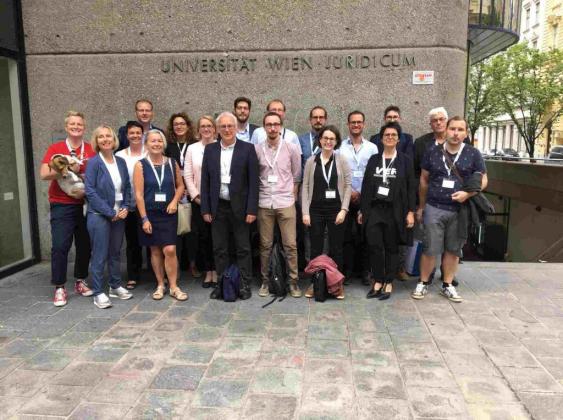UniGR-CBS at the World Conference Border Studies

UniGR-CBS at the World Conference Border Studies
For the second time, the Association for Borderland Studies, the world’s largest network of researchers in border studies, organised the World Conference Border Studies from 10–14 July 2018. The 5-day-conference with the main focus on “Border Making and its Consequences” took place in two countries and was co-organised by the University of Vienna (AT) and the Central European University in Budapest (H).
450 researchers in Border Studies from 54 countries met in Austria and Hungary, of which roughly 20 researchers from the UniGR-Center for Border Studies.
As partners of the World Conference, they organised seven panels in cultural and social Border Studies research focusing on migration, cross-border mobility, the labour market, regional development in cross-border regions, and on different case studies in Southwestern Europe:
- Border Textures: Interwoven Practices and Discursive Fabrics of Borders
- Cross-border Workers and cross-border Labour Markets
- Citizenship, statelessness and minorities
- “Learning Border Regions” – Border Regions as Regional Learning Processes
- Migration and Flight in Western and Southern Europe
- The transformation/development of businesses in towns in border areas
- What is Border Studies?
With the much-attended panel “What is Border Studies?”, the UniGR-Center for Border Studies initiated a lively debate within the scientific community about the multidisciplinary research topic itself. Moreover, the Border Textures concept developed by the UniGR-Center for Border Studies proved useful for many disciplines and caused productive discussions among Border Studies researchers.
Furthermore, Saarland University cooperated with the University of Vienna within the project „Border-Making and its Consequences: A Global Overview“. Thanks to the financial support of the Bundeszentrale für Politische Bildung [Federal office for political education, D], selected presentations of the conference could be recorded and will be made available for digital learning activities at the universities.
Finally, there was a particular highlight for two doctoral students of the UniGR-Center for Border Studies: Ulla Connor (University of Luxembourg) and Eva Nossem (Saarland University) were awarded a mobility support for their presentations by a top-class jury.
Two other highlights of the conference were a Gala reception in the townhall of Vienna and a common excursion to the memorial at the border crossing point of St. Margarethen (AT) / Sopronkőhida (H) – this is where the Pan-European picnic took place in 1989.
The commitment of the colleagues during the conference has not only strengthened the international visibility of the UniGR-Center for Border Studies; personal contacts with researchers in Border Studies could likewise be initiated and deepened. On the mid and long term, these will turn out the reference points for stable cooperation with renowned universities outside the Greater Region.
The participation of the UniGR-Center for Border Studies to the World conference Border Studies 2018 was co-financed by the Interreg V A Greater Region programme.
